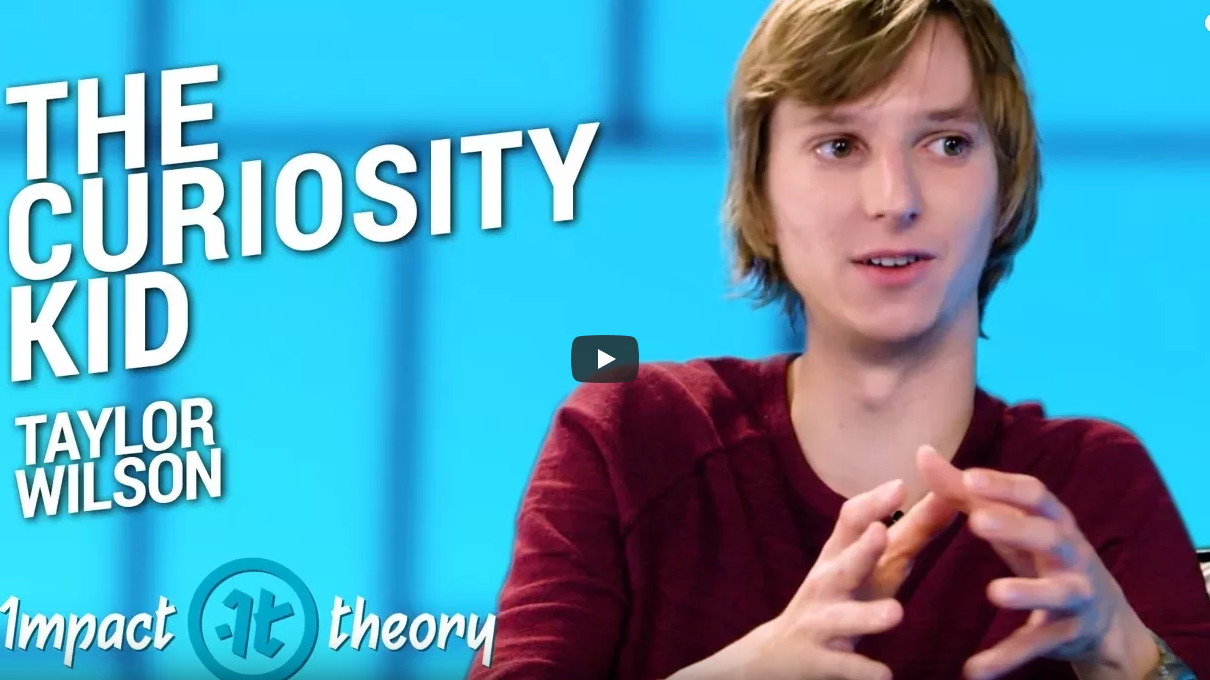The Making of a Self Educated Child Genius

At the age of 14, Taylor Wilson built a nuclear reactor in his parent's basement and achieved nuclear fusion, becoming the 32nd person in history to do so, and the first person to do it at his age. He then went on to become proficient in at least 20 other fields of science and engineering, like biology, chemistry, physics, astronomy, etc.
He's currently focusing on using nuclear science to solve problems in several fields. He's building a new, safer (and cheaper) nuclear reactor, he's invented the cheapest neutron detector designed to detect dirty bombs, and in the field of nuclear medicine he designed a device which lowered the cost of cancer detection.
The really interesting part is that he did all this through self education, deep passion and an insatiable curiosity. He found all the relevant materials online and exchanged emails with physicists, engineers and nuclear scientists. In fact, he credits the internet for enabling him to do this project in record time.
I stumbled upon Taylor in a podcast interview with Tom Bilyeu called Impact Theory where Taylor talks about how to managed to achieve all his accomplishments while still in high school.
In this essay, I'll deconstruct Taylor's methods for building a remarkable career.
We’ll talk about:
- How Taylor managed to escape the woeful fate of many child prodigies who never amount to anything in adulthood
- How he found and nurtured his passion for nuclear science
- How he got scientists and engineers from around the world to mentor him, teach him and later collaborate with him
- And finally how he taught himself, his secret method for radical self education.
Wasted Child Prodigies
Taylor credits his obsessive passion, insatiable curiosity and unrelenting drive to achieve for his success. "That's always been my personality" he says in the interview, "If I decided I wanted to do something, I was going to do it" but he’s careful about calling himself a genius.
In the interview, Taylor states that he doesn't believe the secret to success is pure aptitude: "Aptitude is important but not that important" he says. "What matters more is if you’ve taken the time to really learn about a subject."
You can have very high aptitude for a field, like science or mathematics, yet be unable to achieve greatness.
Sounds pretty reasonable, but what if you wanted to replicate it?
How can you achieve what he's achieved?
How can you have such an amazingly impactful career?
What's his secret?
We need to delve a little deeper.
The first clue came to me from a very unlikely source.
Eliezer Yudkowsky wrote a fascinating Harry Potter fan fiction book called Harry Potter and the Methods of Rationality where Harry is a child prodigy and his step father is a professor. It is by far my favorite fan fiction book. It's very long and incredibly fascinating but this quote early in Chapter 6 gives us a clue to Taylor's success
“Harry had always been frightened of ending up as one of those child prodigies that never amounted to anything and spent the rest of their lives boasting about how far ahead they’d been at age ten […] because those other geniuses hadn’t gotten their hands on the one thing you absolutely needed to achieve greatness. They’d never found an important problem" [emphasis mine]
Finding an Important Problem
By focusing on the field of energy Taylor found a very important, highly impactful problem to become obsessed with. By further focusing on nuclear energy, as opposed to other sources (like fossil fuels, wind, solar, etc) Taylor has also found a branch of science that has applications beyond energy (e.g. nuclear medicine, homeland security, etc.)
He realized that the amount of energy stored in 1g of Uranium was far denser than the energy stored in much larger amounts of fossil fuels. He also realized that energy is a powerful key to human progress because it touches everything in our lives, especially with the advent of global climate change. The nuclear reactor he's building is safer, cheaper, easier to build and much smaller than the current reactors.
Ok we now have the first key to Taylor's success. But is it enough?
In the podcast, Taylor mentions the word “passion” in every other sentence. Passion is one of those esoteric subjects that everyone talks about, but very few have any idea how to find or nurture it. Even those who claim to be passionate about something have no clue how they got there.
So how do you find something you're passionate about? Or - a better question - how do you become passionate about something?
Deconstructing the Secret Code of Passion
When I was about 9-10 years old, I remember very vividly finding my mom's high school Physics books in the attic of my grandparent's home. These were books meant for 16 and 17 year-olds but I started reading them and surprisingly understanding them.
I remember being fascinated and later obsessed with electricity and electromagnetism and I build several electromagnets with stuff I found lying around (batteries, wires, old toys, etc.) You could say I was passionate about physics.
Taylor recalls a similar experience with nuclear science "I was passionate about it, I was obsessed with this stuff" he says.
Passion is the emotion you feel when you're deeply motivated to pursue something and you're fully immersed in the experience. But how does it work?
We get our second clue in professor Cal Newport’s 2012 book So Good They Can't Ignore You
In the book, Cal Newport sets forth a very compelling argument that passion is not important, what's important is to what he calls “the craftsman mindset.”
He argues that passion comes after you've mastered something and that the most important thing to look for in a job is autonomy. This is based on a scientific theory of intrinsic motivation known as SDT (Self Determination Theory)
But wait, there's more...
Later in the podcast, Taylor says:
"You have to stick with something long enough to get a good enough grip on it, before you find that passion"
This seems to validate Cal Newport's thesis that you need mastery before you feel passion.
SDT explains a lot about what we consider to be the feeling of passion, especially that unrelenting motivation to keep digging into something. There is also a second theory that adds an important missing nuance to SDT. This is the theory of Flow States which has been studied extensively by Mihaly Csikszentmihalyi.
The combination of SDT and Flow explains the unrelenting desire to keep pursuing something even in the absence of external motivation. In order to understand how this desire works we'll take another quick detour into the fascinating fields of motivation and human performance.
You can find thousands of web articles, academic journals and books on intrinsic motivation, but a far more accessible discussion is detailed in the book Drive: The Surprising Truth About What Motivates Us by Dan Pink
In this book Dan Pink details the three needs (also called nutriments in academic research) that make up our drive to pursue anything:
- Autonomy: The desire to be self-directed in everything we do
- Mastery: The desire to get better at something
- Purpose: The desire to do something important, meaningful and impactful
Great, now let's now look at the theory of flow states.
In positive psychology, a flow state, also known colloquially as being in the zone, is the mental state of operation in which a person performing an activity is fully immersed in a feeling of energized focus, full involvement, and enjoyment in the process of the activity. In essence, flow is characterized by the complete absorption in what one does, and a resulting loss in one's sense of space and time.https://en.wikipedia.org/wiki/Flow_(psychology)

The above chart explains quite clearly how we achieve a flow state. It's essentially the perfect combination of a challenging task and our skill level for accomplishing that task.
If a task is too challenging and our skill level is low, we feel Anxiety (if we need to complete the task say for work or for school)
If a task is too easy and our skill level is high, we feel Boredom
However, if the level of difficulty is perfectly matched to our skill level, we experience a state of Flow characterized by feeling "in the zone", fully immersed in the task, where we lose all sense of space and time.
There were moments during his project where Taylor would be so immersed in what he was doing that he'd forget to eat. It's very easy to explain these feelings as "passion" however having a more scientific explanation allows us to replicate it for ourselves.
We now have the formula for passion:
Passion = Autonomy + Mastery + Purpose + Flow
So how does this apply to Taylor Wilson?
First, Taylor was interested in rocket science. In a special segment for ABC News there's a video of him as a 9 year old explaining rockets during his science project (at the 2:24 mark)
Interest in rockets led to interest about energy sources that power rockets and though that's usually solar energy, sometimes nuclear batteries are used. Upon landing on energy as a field of study Taylor found his main Purpose in life.
Because his project to build a nuclear reactor in the basement was a self-directed learning project it encompassed both Autonomy and Mastery. Powered by an insatiable curiosity, Taylor embarked on a journey of self education, and as he progressed through his project, he learned more. The more he learned, the better his skills got.
This way both the level of skill and the level of the challenge were both perfectly balanced setting the conditions for him to experience a state of Flow which he interprets as passion.
How to Acquire the Knowledge
We've just deconstructed how Taylor became passionate about nuclear science; but how did he then go about acquiring the knowledge required to become a nuclear scientist?
Taylor started with a project. He decided he would build a nuclear reactor, did some research, saw that it was possible to do and decided to acquire the knowledge as he went about finding the materials and schematics of the reactor by:
"First, getting the overarching themes of a new field and second getting into the personalities of the people who made the discoveries, what were their motivations, what questions did they seek to answer, what was their training/background. A lot of Nobel prize winners were right at the edge of their fields or made their discoveries outside of their fields."
"Even something as complicated as quantum mechanics, which is very unintuitive can be easily understood if you study the motivations of the people who came up with the theory. You can then see the logical stepping stones from concept to concept. You get to see guys who weren't really that much more intelligent from you but who were able to make the logical leaps from one concept to the next."
Then Taylor mentions his core belief and main technique he followed to teach himself everything he could about science and engineering. He states:
"I really believe the best way to learn about a topic is to study its history."
This is a very interesting approach to learning; one I've never seen discussed anywhere. The main reason it's successful is because our minds tend to really like information when it's presented in narrative form. Before the advent of the written word and the invention of the printing press, the only way knowledge was passed down from the elders was in the form of stories.
There isn't much space here to get into the depths of narrative rationality and the power of stories, but suffice it to say that organizing your knowledge acquisition around the stories of the main characters in any field makes for a far more effective and interesting learning experience than reading a dry academic textbook.
Even now that he's established in his field, Taylor continues to learn about new subjects but the strategy has changed. Using his field as an anchor, he then dives into adjacent fields which connect tangentially to nuclear science.
He tries to reach out to people who are working in fields that are radically different from his own and he tries to see if something from his field can help them in their work or vice versa.
Here's Taylor's attitude towards learning from others in his own words:
"Being in a room with someone who has knowledge I don't have is the best feeling in the world. Being able to absorb their knowledge is the best feeling in the world"
This same attitude and approach allows him to get unstuck in situations when he feels that his thinking is in a rut.
Achieving Credibility and Finding Mentors
At some point in your learning projects you might need to ask for help from someone more knowledgeable. This is the most difficult part of the project.
When you go to college, the idea is that you have access to the brightest minds in any field either directly or through connections. When you're doing a self-directed learning project however it is nearly impossible to find mentors. So how did Taylor do it?
He did it by accomplishing something that's extremely rare, namely building a working fusion reactor at the very young age of 14. The level of impressiveness is off the charts! Can anyone do impressive things? If so, how?
The clue for this question comes from another article by Dr. Cal Newport. In a post from 2008 he introduces the Failed Simulation Effect
The Failed Simulation Effect states that when presented with anyone's accomplishments, you tend to mentally try and simulate the path they took to get there. If you can easily simulate this path, no matter how arduous or hard, you won't feel as impressed.
If however you find that you cannot simulate their path, you feel a sense of wonder and curiosity which you interpret as impressiveness.
Now if you hear that a 14 year old kid built a working nuclear reactor in his parent's basement, and you run that through your mental simulator you can't help feeling very impressed.
Now that Taylor has earned national recognition for his work, he has the necessary credibility to easily find mentors and collaborators.
In conclusion, I believe that it's even easier these days to use the myriad tools available online to design a self directed learning curriculum that suits you and that can help you accelerate your career without the need to go to college or get additional degrees. In fact your future depends on it.




